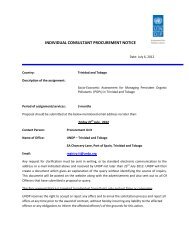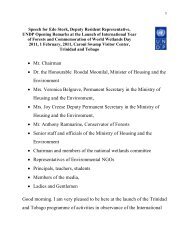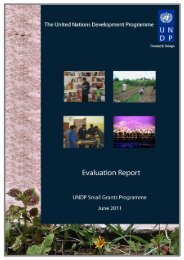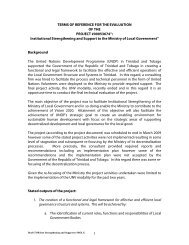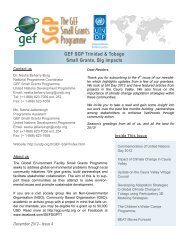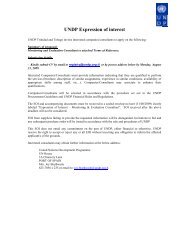The View from the Boardroom - UNDP Trinidad and Tobago
The View from the Boardroom - UNDP Trinidad and Tobago
The View from the Boardroom - UNDP Trinidad and Tobago
You also want an ePaper? Increase the reach of your titles
YUMPU automatically turns print PDFs into web optimized ePapers that Google loves.
<strong>The</strong> <strong>View</strong> <strong>from</strong> <strong>the</strong> <strong>Boardroom</strong> - CEO Study on Corporate Social Responsibility in <strong>Trinidad</strong> <strong>and</strong> <strong>Tobago</strong>CHAPTER 1CSR in <strong>Trinidad</strong> <strong>and</strong> <strong>Tobago</strong> – Strategic Evolution or Preserving <strong>the</strong> Status Quo?CSR in <strong>Trinidad</strong> <strong>and</strong> <strong>Tobago</strong> –Strategic Evolution orPreserving <strong>the</strong> Status Quo?CHAPTER 1In 2008, a pioneering study on <strong>the</strong> practice of CSR in <strong>Trinidad</strong> <strong>and</strong> <strong>Tobago</strong>published jointly by <strong>the</strong> United Nations Development Programme (<strong>UNDP</strong>) <strong>and</strong><strong>the</strong> STCIC (now Energy Chamber) found that in <strong>the</strong>ir social commitments <strong>the</strong>majority of T&T-based companies focused predominantly on <strong>the</strong> philanthropicmodality of Charitable Giving, something that suggested a strong emphasis onreputation management through public relations <strong>and</strong> a ‘h<strong>and</strong>-out’ mentalityunderlying local CSR efforts. At <strong>the</strong> same time, <strong>the</strong> research produced only scarceevidence of any strategic integration of CSR principles <strong>and</strong> considerations intocompanies’ business processes <strong>and</strong> into <strong>the</strong>ir overall planning framework. <strong>The</strong>authors of <strong>the</strong> study concluded that “many programmes <strong>and</strong> projects are fundedon an ad hoc basis resulting in a lack of sustainability <strong>and</strong> alignment with <strong>the</strong>companies’ business plans.” 7Such findings were not confined to<strong>Trinidad</strong> <strong>and</strong> <strong>Tobago</strong>’s Private Sectorbut characterised o<strong>the</strong>r Caribbeanmarkets as well. 8 Arguably, CSR hasbecome an increasingly familiarfeature of companies competing in<strong>the</strong> local market place. CEOs acrosssectors <strong>and</strong> industries representingmultinational, larger national as wellas Small <strong>and</strong> Medium Size Enterprises(SMEs) have embraced <strong>the</strong> notionthat in today’s corporate world,sustainable business practices <strong>and</strong> acommitment to <strong>the</strong> public commongood have become a permanentbehavioural reality. <strong>The</strong> launch of<strong>the</strong> ISO 26000 by <strong>the</strong> <strong>Trinidad</strong> <strong>and</strong><strong>Tobago</strong> Bureau of St<strong>and</strong>ards (TTBS)in October 2011 is a case in point forillustrating such growing conviction<strong>and</strong> signaled <strong>the</strong> readiness of <strong>the</strong>local market environment to adoptinternationally recognised st<strong>and</strong>ardsof corporate responsibility. Everysingle CEO interviewed for this reportacknowledged that businesses have aresponsibility for contributing towardssocial wellbeing <strong>and</strong> environmentalsustainability. Seeking to transcend<strong>the</strong> strict separation between <strong>the</strong>moral dimension of wealth creation<strong>and</strong> <strong>the</strong> commercial interest in profitmaximisation, Norman Christie,President of bpTT uses <strong>the</strong> concept ofSustainability to explain his reasoningbehind <strong>the</strong> integration of CSR into hismanagerial decision-making process:“I like <strong>the</strong> idea of long-term thinking.Truly realising what long-term meanspromotes a reconciliation of <strong>the</strong> strictprofit motive <strong>and</strong> a motive that mightbe viewed as more altruistic <strong>and</strong> beingdone to satisfy society. <strong>The</strong> point thatI hold is that <strong>the</strong> two motives canconverge if a person thinks about <strong>the</strong>long-term. When I define ‘sustainable’I define it actually in a way thatcauses <strong>the</strong> convergence of <strong>the</strong> longtermsurvivability of a company orenterprise <strong>and</strong> people <strong>and</strong> <strong>the</strong> planet.”7 Mapping Corporate Social Responsibility in <strong>Trinidad</strong> <strong>and</strong> <strong>Tobago</strong> – Private Sector <strong>and</strong> Sustainable Development’, <strong>UNDP</strong>/STCIC Mapping Project 2007, p.8 <strong>The</strong> Jamaica Employers’ Federation highlighted a similar focus of its member companies on philanthropy <strong>and</strong> charitable giving in its report ‘Corporate Social Responsibility in Jamaica 2007’.See also Fabio Balboni, Wayne Charles-Soverall, Brigette McDonald Levy, ‘New Perspectives on Corporate Social Responsibility in <strong>the</strong> Caribbean’, Caribbean Development Review, No.1, p.27.17




